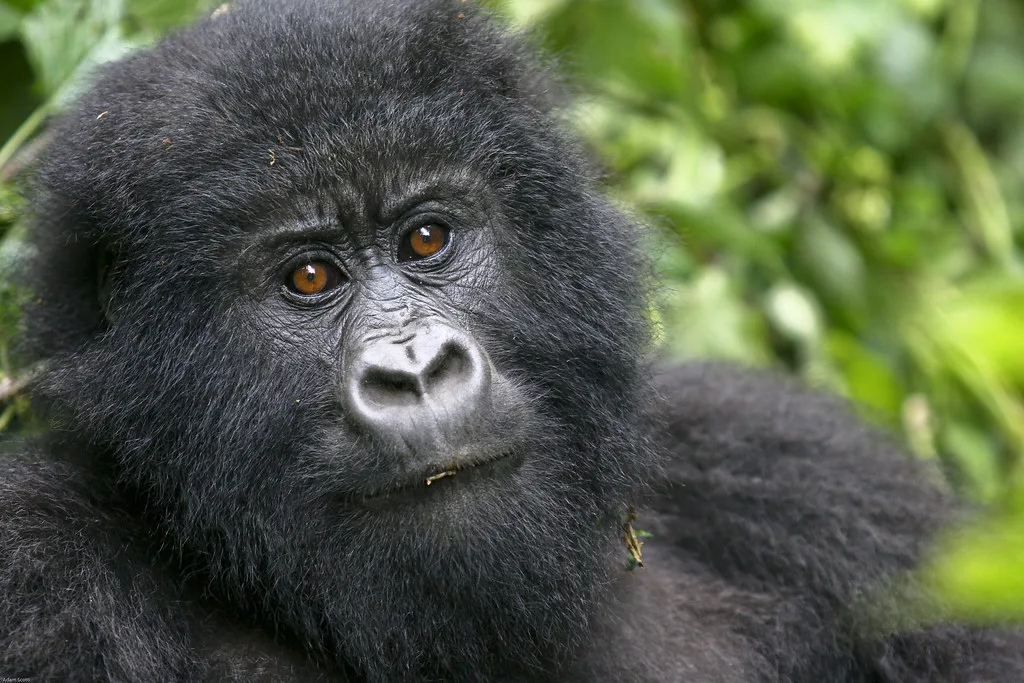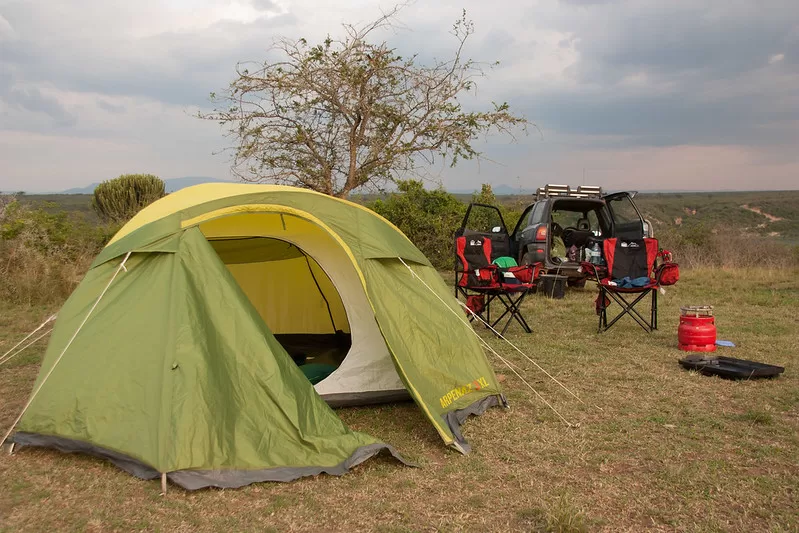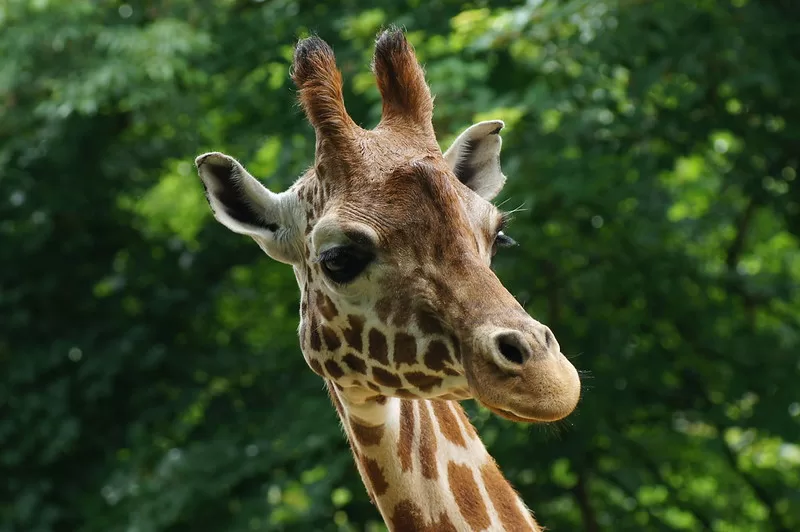Where to do primate habituation experience safaris in Uganda
Primate habituation experience
Compared to an hour of primate trekking, the primate habituation safari in Uganda allows you to spend more time with the endangered chimpanzees and mountain gorillas. Primate habitats in Uganda include Bwindi Impenetrable National Park, Kibale National Park, and Kaniyo Pabidi.
You need permission from the Uganda Wildlife Authority to embark on a gorilla or chimpanzee habituation expedition in Uganda. Reservations for permits must be made in advance since gorilla or chimpanzee habituation is restricted to a maximum of 4 visitors. The demand for gorilla or chimpanzee trekking is increasing every year, but only four people are allowed to participate in order to minimize disruption.
Primate Habituation Safari: What Is It? – Primate habituation experience
In the adventure known as “primate habituation,” visitors accompany a group of researchers and trackers into the jungle to follow untamed monkeys and acclimate them to human presence without altering their natural behavior.
In Uganda, you can embark on chimpanzee or gorilla habituation safaris.
Where in Uganda Can I Go on a Primate Habituation Safari?
Bwindi Impenetrable National Park – Primate habituation experience
Gorilla habituation is possible in the Rushaga, Nkuringo, and southern regions of Bwindi Impenetrable National Park. Gorilla habituation adventure has so far been found in two gorilla households.
Obtaining a Uganda Wildlife Authority gorilla permit and spending four hours observing gorillas. Since these mountain gorillas roam freely in the wild, the best time to find them is still up in the air. Additionally, there are roughly eighteen gorilla families in the jungle that are fully habituated and available for gorilla trekking reservations.
You might see other primates like black and white colobus, red-tailed monkeys, grey-cheeked mangabey, blue monkeys, ghosts, and others while traveling through Bwindi Impenetrable National Park, which is a biosphere reserve.
With over 335 known bird species, including Albertine endemics and more than seven species on the IUCN Red List, Bwindi Forest is a birdwatcher’s paradise in Uganda.
How to Travel by Road
Kabale, Kampala, Kanungu, and Buhoma
Traveling from Kampala to Ntungamo, Rukingiri, Kihihi, and Buhoma
Nkuringo to Kabale to Kampala
National Park Queen Elizabeth to Kihihi to Buhoma
By Air
Domestic flights to Kihihi Airport are scheduled daily from Kajjansi Airport or Entebbe Airport.
Additionally, charter flight services are offered.
Reservations for lodging in Bwindi Impenetrable National Park for a gorilla habituation safari.
In order to avoid having to get up in the middle of the night and drive in the dark to catch the briefing, it is recommended to reserve lodging in the southern section of Bwindi Impenetrable National Park.
Among these are Clouds Lodge, Rushaga Gorilla Eco-lodge, Gorilla Safari Lodge, Nkuringo Gorilla Lodge, Ichumbi Lodge, and Trekker’s Tavern.
Kibale National Park
Although there are more than 1500 chimpanzees in Kibale National Park, you can engage in chimpanzee habituation. You join a group of researchers and habituators on their daily mission to help the wild chimpanzees become acclimated to human presence during the chimpanzee habituation safari in Kibale National Park.
The chimpanzees still need to get used to being around people, so expect some crazy behavior from them. Over the course of your four-hour watch, the chimpanzees might hide. When this occurs, stop whatever you’re doing and allow researchers to guide you.
During the early morning session, you might spot the chimpanzees right after they’ve finished nesting. You might see chimpanzees building nighttime nests during the afternoon habituation session.
How to Get There
Kibale National Park is reached by two roads, forming a circuit that is:
The northern route is from Kampala to Mubende to Fortportal to Kanyanchu.
The southern route is Kampala to Mbarara to Kamwenge to Kanyanchu.
By Air Kajjansi Airstrip or Entebbe Airport are the starting points for daily domestic flights to Kasese Airstrip.
For private transportation, charter flight services are also offered.
Booking Accommodations for Kibale National Park’s Chimpanzee Habituation Safari.
Chimpanzee Guesthouse, Ndali Lodge, Kyaninga Lodge, Primates Lodge, Kibale Safari Lodge, and Chimp’s Nest
In Murchison Falls National Park, the Kaniyo Pabidi Forest
Some of Uganda’s rarest chimpanzees can be found in this woodland. The Kincumbanyombo entrance of Murchison Falls National Park is eight kilometers away. One of the few remaining areas with mature mahogany trees is the woodland where chimpanzees reside.
After an early-morning briefing, you follow habituators and researchers into the forest to track the semi-habituated chimpanzees in the wild.
Other primates that you might see are black and white colobus, red-tailed monkeys, olive baboons, and grey-cheeked mangabeys, to name a few.
Numerous birds, including endemic Albertine species, can be found in the Kaniyo Pabidi woodland.
How to get to Kaniyo Pabidi Forest from Kampala via Luwero, Budongo, Karuma Falls, Kicumbanyombo Gate
Accommodations at the National Park of Murchison Falls: Baker’s Lodge, Red Chillis Camp, Nile Safari Lodge, Sambiya Lodge, Paraa Safari Lodge, and Murchison River Lodge
How Much Do Ugandan Primate Habituation Permits Cost?
Cost of a Gorilla Habituation Permit
Foreign nonresidents pay $1500 per person, foreign residents pay $1000, and East African citizens pay 750,000 shs.
What Does The Price Of A Gorilla Habituation Permit Include And Exclude?
A gorilla habituation ticket costs four hours with the mountain gorillas and covers park taxes, security, ranger guide services, assistance for the local people, and gorilla conservation.
Accommodation, porter fees, tips, and any other personal belongings are not included in the purchase of a gorilla habituation permit.
The cost of a chimpanzee habitat permit in Kibale National Park
In Kibale National Park, chimpanzee habituation treks cost $300 per person.
Ranger guides, park fees, four hours with the chimpanzees, security, and chimpanzee conservation support are all included in the price of chimpanzee habituation at Kibale National Park.
The cost of a chimpanzee habitat permit does not include refreshments, transportation, porter services, or any other personal belongings.
How Long Is a Habituation Safari for Gorillas or Chimpanzees?
The amount of time you spend on these monkey safaris is unclear, whether you are going on a chimpanzee or gorilla habituation experience in Uganda. There is nothing to prohibit these primates from wandering freely in the wild.
After two hours, some visitors have found the chimpanzees or mountain gorillas, while others may need more time. Since there are many things that influence the mountain gorillas or chimpanzees to travel or remain in the forests, it would be advisable to exercise patience.
You must be physically fit enough to navigate the bush more easily because gorilla and chimpanzee habituators move at different speeds.
To what extent is primate habituation challenging in Uganda?
Habituation in primates, such as chimpanzees or gorillas, occurs in the forest. These wooded regions may have highlands, such as those seen in Bwindi Impenetrable National Park.
Wear a comfortable bug repellent because the stinging insects in the forests can irritate your skin.
Wear long sleeves, long pants, and garden gloves because the fauna may include stinging nettles.
Whether on chimpanzee or gorilla habituation, they have a certain degree of fitness to avoid muscle pulls during the journey. You might not realize how long primate habituation trips can take.
Is It Safe to habituate primates in Uganda?
The best precaution is to listen to the team of seasoned habituators and researchers who are familiar with the characteristics of chimpanzees or mountain gorillas.
Other security services are in place to maintain peace and order in each of the Ugandan National Parks where chimpanzee or gorilla habituation safaris take place.
You should only enter the forest with a ranger guide to ensure your personal safety. Try to adhere to the gorilla or chimpanzee habituation guidelines and stay near the group you are habituating with.
For added protection, bring the appropriate gorilla or chimpanzee habituation equipment that you can utilize in the wild.
What Distinguishes Ugandan Chimpanzee Habituation From Gorilla Habituation?
Experiences with gorilla and chimpanzee habituation bring you closer to the closest relatives of humans in the wild. An African safari experience that will never be forgotten is encountering chimpanzees or mountain gorillas on a habituation trip.
In Kibale National Park, chimpanzee habituation costs $300 per person, whereas gorilla habituation permits cost $1500 per person.
Gorilla habituation occurs once a day, but chimpanzee habituation occurs in two periods, morning and afternoon.
Chimpanzees can be habituated in Kibale National Park or Kaniyo Pabidi Forest, whilst gorillas are currently habituated in southern Bwindi Impenetrable National Park.
Is it possible to purchase Ugandan primate habitat permits in installments?
The wisest course of action is to purchase all of your gorilla or chimpanzee habituation permits, but you may need to be able to do so for a variety of reasons.
Installment payments of 30% and 70% of the total amount are accepted by the Uganda Wildlife Authority for gorilla or chimpanzee habituation licenses, respectively.
Please take note that you can only purchase gorilla or chimpanzee licenses in installments if you do so at least ninety days before the date of the habituation adventure.
Make sure to replenish 90 days before the date of chimpanzee or gorilla habituation. If you don’t, you can be penalized.
When Can I Reserve a Habituation Permit for Chimpanzees or Gorillas?
Chimpanzee or gorilla permits are available every day of the year, but they quickly sell out due to their limited supply—four per day or every session.
Primate habituation licenses, particularly those for the busiest months of June, July, August, September, December, and January, can be obtained at least six months to a year in advance.
Due to low demand, the low season months of March, April, May, and November are probably still accessible at the last minute, though this is not always the case.
Due to the limited safari amenities, make all of your reservations in advance to avoid last-minute stress when organizing your primate habituation safari in Uganda.
How Risky Are Primates in Uganda During a Habituation Safari? – Primate habituation experience
The chimpanzees or mountain gorillas that are habituated are just slightly used to seeing people. Although they are not aggressive, you should heed the counsel of researchers and rangers who possess knowledge of the characteristics of the chimpanzee community or mountain gorilla family.
Because these primates are wary of people entering their habitat, keep your cool around them. To prevent upsetting the mountain gorillas or chimpanzees, TRY not to provoke them. During a habituation adventure, you get four hours with the chimpanzees or mountain gorillas, but once they see something strange, they might hide.
Despite their enormous size and frightening demeanor, mountain gorillas are often quiet and timid creatures. The chimpanzees might attempt a non-violent altercation.
What Are The Guidelines For Uganda’s Primate Habituation Safari? – Primate habituation experience
Since the chimpanzees and mountain gorillas are vulnerable to contagious diseases like the flu or cough, offer to stay behind if you get any of these.
To prevent killing the chimpanzees or mountain gorillas during primate habituation, speak quietly. You can come out as suspicious.
To prevent being exhumed by woodland inhabitants, ask the ranger guide to dig a hole for you and cover it completely if you want to make a lengthy call.
Avoid leaving trash in the forest, especially non-biodegradable items, as this might change the forest’s ecosystem and the food source for mountain gorillas.
Avoid spitting on the ground or plants that chimpanzees or mountain gorillas eat.
You get four hours to spend with the primates after you find them.
Chimpanzee habituation is for visitors who are at least 15 years old, but gorilla habituation is only for visitors who are at least 15 years old.
Stay away from chimpanzees and mountain gorillas if you want to eat or smoke, to lessen the possibility that they will take it from you and consume it. Since they are untamed creatures, they have to search for nourishment.
Avoid using flash photography when shooting pictures. You might frighten the chimpanzees or mountain gorillas.
Before entering the forest during gorilla or chimpanzee habituation, put on a mask and some hand sanitizer.


